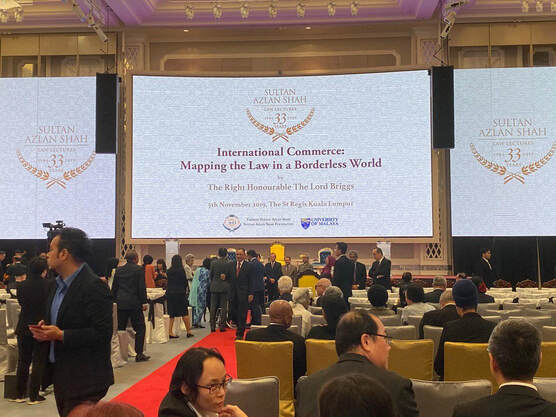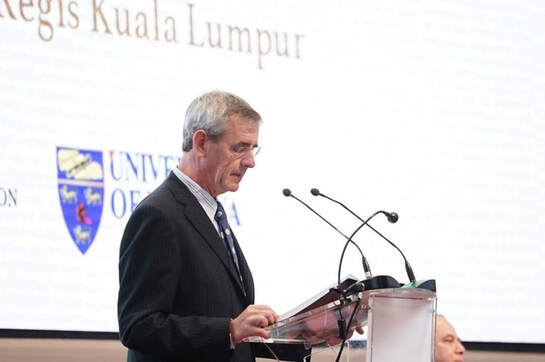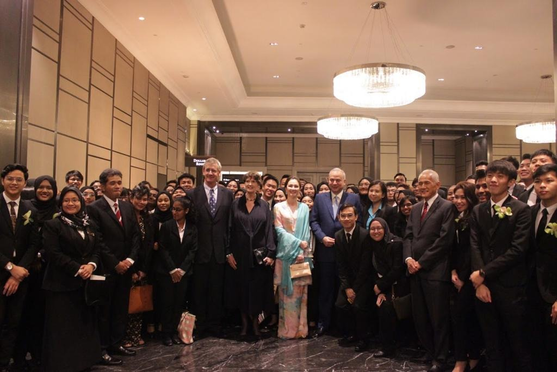|
26/11/2019 0 Comments The 33rd Sultan Azlan Shah Law Lecture - International Commerce: Mapping the Law in a Borderless WorldLandscape view of the coveted 33rd Sultan Azlan Shah Law Lecture at the Grand Ballroom of the St. Regis Hotel, Kuala Lumpur. On 5th of November 2019, the 33rd Sultan Azlan Shah Law Lecture was held at the Grand Ballroom of the St. Regis Hotel, Kuala Lumpur. The lecture was organised by the Sultan Azlan Shah Foundation and the University of Malaya. It was an honour to have a highly-esteemed guest speaker, The Right Honorable, The Lord Briggs of Westbourne, Justice of the Supreme Court of United Kingdom to deliver a speech on the topic of ‘International Commerce: Mapping the Law in the Borderless World,’ in the presence of DYMM Paduka Seri Sultan Perak Darul Ridzuan, Sultan Nazrin Shah, and DYMM Raja Permaisuri Perak Darul Ridzuan, Tuanku Zara Salim. Lord Briggs inaugurated the lecture by recognising how countries like Malaysia and the United Kingdom have played pivotal roles in the astonishing expansion of International Commercial Law. He added that our assistance have, for the most part, been beneficiaries of this phenomenon. Through our support, International Commercial Law has been granted investment from abroad, employment and voluntary work, manufacturing service industries, and access towards markets for goods and services that have transformed the lives of almost everyone. The Right Honorable, The Lord Briggs of Westbourne, Justice of the Supreme Court of United Kingdom delivering the lecture. Image credits: https://www.facebook.com/pejaofperak/?tn-str=k*F Lord Briggs also shared his personal experience in the UK Supreme Court where he witnessed the world coming together as a community establishing international standards of mobile phone technology, making it the most modern and sophisticated device available at a reasonable cost for more than a billion users worldwide. This expansion of international commerce has been regulated by numerous factors under the general heading of globalisation. They include political conditions and technical factors such as the internet which knows no actual boundaries. They increase the efficiency and reliability of international travel and transport, with legal factors which denotes the rule of law as the essential element of a democratic society, not only within but also across national boundaries. Taking into account the national political and apolitical aspirations of many countries around the world, it is only fitting that we examine the rule of international law in support of the regulation of International Commerce. This is to better understand the vital role it plays in underpinning the benefits of global privilege. He also mentioned the general concept of the rule of law, whereby it provides for a framework which guides the lives of individuals in freedom and harmony, honour and respect of each other’s beliefs, human rights, and expectations. He acknowledged that there will be inevitable disputes which will be determined by independent and skilled judges, public scrutiny in an open and transparent justice system — to which everyone has access, and that the judicial ruling will be executed by the state. Generally, the rule of law is a concept which exists within, rather than across, national borders. In contrast, the rule of law in the context of cross-border commerce operates in a distinct manner as there is neither a developed system of international commercial law nor are there any transnational courts or law enforcement authority. The rule of law depends heavily on a few matters: first, upon merchants in choosing a mutually agreed system of law and jurisdiction to be incorporated into their contracts; second, the availability of sufficiently developed systems of law among which merchants can opt into; third, the accessibility to courts and tribunals with the skill and resources to resolve cross-border disputes speedily and efficiently. Courts and tribunals must also take due regard on their independence — sufficient to promote public confidence that neither the home trader nor the injured party will be unjustly preferred. Additionally, the rule of law in this context also depends on the existence of a mechanism to enforce the court and tribunal’s decisions effectively. In regard to cross-border insolvency, systems to deal with the matter must be in place and, under which, reconstruction must be considered. If reconstruction fails, all the international creditors of the insolvent business will receive equal treatment to share the remaining assets, regardless of competing interests. Lord Briggs further stated that the purpose of this lecture is to describe and explain some of the cross-border structures which contribute to the rule of law in International Commerce, look at the difficulties and hardships facing the merchants when venturing into cross-border legal relationships, and to highlight some of the pros and cons of different legal and procedural systems offered. Historically, merchants around the globe regulated their affairs in perfect harmony under the dictate of customary rules and procedures known as lex mercatoria, without the assistance of the government. Disputes were said to be settled by referring to a supposed custom on merchants rather than by fusty lawyers and judges. The lex mercatoria knew no borders, and it does not result from the command of the sovereign as it has not been enacted by the state, nor endorsed in an international convention. There are, however, circumstances where the merchants have to resort to arbitration, primarily due to the lack of jurisdiction of the courts, commercial expertise of common law judges, and inability to communicate in other languages aside from English. Lord Briggs then continued the lecture by posing one question; what do merchants doing business at cross-borders want from the dispute resolution and enforcement system which regulate the dealings? First and foremost, their focus is on clarity and certainty in the legal rules, by which they and their trading counterparties must abide. ‘Certainty’ here is not merely referring to a situation after the dispute arose pending precise and reliable advice but rather, the certainty of what the rules are even before the dispute could have accrued. Secondly, substantive justice and fairness. This concept is not only limited to the context of commercial law, but is also applicable to tribunals or national courts. This is vital in order to ensure that the tribunals and courts will act fairly towards all the merchants regardless of their countries by not unjustly favouring the home trader. It is paramount to ensure that the tribunal is incorruptible, independent on its own, affordable and accessible. Thirdly, merchants want reasonable speed, efficiency, and finality. When they attain those, they may consider compromising several procedural aspect of the disputes. For example, they may, depending on the identity and the integrity of their counterparty, want to regulate the enforcement towards a more favourable outcome. Lastly, the merchants will want to prioritise privacy as it is unlikely for them to risk reputational damage. Moving on, Lord Briggs also emphasised on the fact that Common Law probably remains as the most frequently and freely chosen system of national commercial law by parties contracting across borders. Several countries have recently adopted the English Commercial Court Model. These countries set up an English-speaking commercial court which resolves cross-border disputes by applying the law chosen by the merchants submitting to their jurisdiction. He also highlighted that it is necessary to deal separately with the development between substantive law and jurisdiction, its enforcement as well as procedure. Commercial counterparties have a wide degree of freedom of choice in identifying the rules which will govern their relationship. For instance, they can make a contract for sale and purchase in the very simplest of terms, or they can negotiate all the detailed terms, or they may want to incorporate a set of widely used standard terms, et cetera. There has been a remarkable search to develop a system of international commercial law that is independent of the law of any nation state. There have been products from the lengthy and skilled work that the international team has established, working under the offices of international law such as the United Nations. There are two main types of systems which are the International Legal Convention and the forms of model law. Delving first into the substantives of the International Legal Convention, this system plays a role in setting out a comprehensive statement of the law about a particular subject. When ratified by a particular state, it then becomes the law of that state on that particular subject. He then cited two very important but different examples which included the UN Convention on Contracts for the International Sales of Goods, promulgated by the United Nations Commission on International Trade Law (UNCITRAL) in Vienna in 1980. Its function is to specify the law applicable to international commerce, i.e., cross-border contracts for the sales of goods as well as repairing or promoting the adoption of new international conventions, model laws and uniform laws. Next is the Convention on International Interests in Mobile Equipment which was promulgated by the International Institute for the Unification of Private Law (UNIDROIT) and adopted in Cape Town in 2001. This Convention deals comprehensively with a narrowed but important subject matter, namely, 'intangible interest', for example, security address in mobile equipment such as airplanes, railway trains, and satellites. The second type of system consists of the forms of model law. These principles are available to private parties where they can exercise a choice on the law applicable to their contract, and not to nation states whereby convention by ratification applies. For instance, the Principles of International Commercial Contracts (PICC). One of the main ideas behind the PICC is that parties can precisely indicate specific features of the UNIDROIT Principles in which they will adopt and exercise during the performance of the contract or when a dispute arises. Furthermore, Lord Briggs also highlighted a prominent feature of International Commerce, that is the Convention on the Recognition and Enforcement of Foreign Arbitral Awards, widely known as the New York Convention. Many of the states, including Malaysia, has also enacted the law on arbitration based on the UNCITRAL model law on International Commercial Arbitration. The effect of the New York Convention and the model law makes arbitral awards relatively easier to enforce across borders around the world. This is in comparison to any judgments, convention, or arrangement between member states for the reciprocal recognition and enforcement of the judgments and orders of their national courts. As for the most recent development, Lord Briggs took cognizant of the new 2019 Convention on the Recognition and Enforcement of Foreign Judgments in Civil or Commercial Matters (‘Hague Judgments Convention’). It has yet been enforced and has only been signed thus far by Uruguay, hence, has yet to be ratified by any states. Thus, the effect remains unpredictable and lies in the future. If it is ratified by the main body of the states which ratified the New York Convention, the Hague Judgments Convention will play an essential part in reducing transactional and litigation costs in cross-border dealings whilst promoting effective access to justice for all. It does, however, provide some exclusion for its scope, including the carriage of passengers and goods, and intellectual property. Lord Briggs also dwelled on the Singapore Mediation Convention, which was signed in August this year by 46 countries including Malaysia. It is intended to facilitate the enforcement of settlement agreements that are entered into with the assistance of mediation. It generally applies to settlement agreements resulting from mediation of international commercial disputes. The Singapore Mediation Convention allows for a settlement agreement to be enforced directly by the courts of the signatory country. This is beneficial in the event where assets are located in different jurisdictions. The key benefit is that the enforcing party can directly apply for enforcement, instead of, first, having to sue the other party in court to obtain a judgment for breach of the settlement agreement. Although it is still new, the encouraging number of the early signatories suggests that it will regularly enforce the status of mediation as a strong competitor of arbitration and as the foundation of the rule of law for international commerce. Additionally, Lord Briggs touched on the need for an effective system for cross-border insolvency which is a constantly evolving and enormously complex subject. He then continued the lecture by stating that none of this international structures, even when backed by national ratifications at countries’ discretion, will deliver anything of effectual use unless the structures are already available in courts or tribunals. The courts and tribunals must be qualified to adjudicate with equivalent speed, efficiency, independence, fairness, and reliability on international commercial disputes, which may be both urgent and complex. Generally, the main business of national courts is to apply their national law in criminal and civil cases arising within their borders. Exercising jurisdiction concerning matters outside their borders has always been regarded as an exception, and usually requires legal specialisation at a certain minimum standard of courts, judges, lawyers, and resources. According to him, the English Commercial Court is practically the oldest, and still the largest specialist court in the world, adjudicating on disputes arising out of International Commerce. The new Rolls building, is certainly the largest specialist business court center of its kind in the world. However, its status has now been challenged with the existence of the Specialist International Court within Singapore, Dubai, Qatar, and Kazakhstan as well as in France and Germany. In all of these Specialist Courts, English is offered as the main language of the court which suits the requirement as English is the primary language of International Commerce. On top of that, Malaysia has its own established Commercial Court, which also uses English as one of its main working languages. On this matter, Lord Briggs is convinced that it will not be long before it develops its international clientele. DYMM Paduka Seri Sultan Perak Darul Ridzuan, Sultan Nazrin Shah and DYMM Raja Permaisuri Perak Darul Ridzuan, Tuanku Zara Salim with the members of the Faculty of Law, University of Malaya. Drawing the lecture to a close, Lord Briggs stated that it would have been incomplete if he ended the lecture without talking about the relevancy of Information Technology (IT) within the legal industry together with the recent development of Artificial Intelligence (AI). He highlighted that as the digital economy continues to establish dominance across the legal industry, and the law changes accordingly — it is possible for law firms to increase the number of records and files they keep electronically, reduce the cost of storage and papers, and increase peace of mind. Lord Briggs is also open to the idea of using AI when deciding on punishments for convicted criminals, and may even adopt the use of advanced technology such as virtual courtrooms and holograms, which will ease the process of court hearing involving cross-border dispute. To him, acknowledging the significance of advanced technology is how we must move forward. Written by Nur Azureen. Edited by Nurul Zafirah and Karim Ariez.
0 Comments
Leave a Reply. |
Archives
July 2023
Categories
|
|
|
PhoneTel : +603-7967 6511/6512
Fax : +603-7957 3239 |




 RSS Feed
RSS Feed